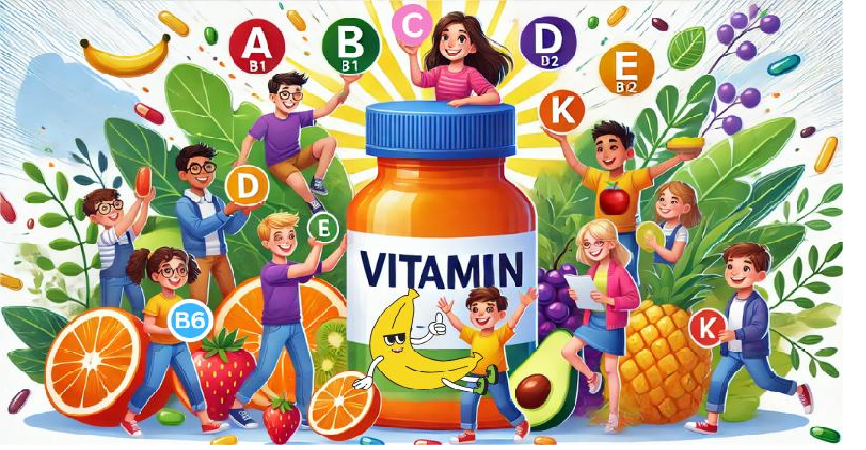Experts recommend whole foods for optimal nutrition, but vitamins for kids and teens can help fill nutritional gaps when needed. The American Academy of Dietetics and the Academy of Nutrition and Dietetics (2020) suggest that whole foods are the best source of nutrients. Supplements should only be considered in cases of deficiency or special dietary needs. For example, children who do not get enough sunlight may need Vitamin D supplements, while those on a strictly plant-based diet may require additional Vitamin B12 or iron. Furthermore, certain picky eating habits, medical conditions, or dietary restrictions, such as vegetarian or dairy-free diets, may also necessitate supplementation. Clear Mind Haven gives you comprehensive details about the best vitamins for kids and teens in the USA.
In these cases, vitamins and minerals are essential for kids and teens because they support various bodily functions, including brain development, strong bones, immune health, and energy production. A well-balanced diet includes fruits, vegetables, whole grains, proteins, and dairy—usually providing all the necessary nutrients. While unnecessary use of multivitamins can lead to excess intake of certain nutrients, which may cause harm. It is always best to consult a paediatrician before giving your child any supplements.
How Vitamins Support Growth and Development in Kids
When children and teenagers do not receive enough vitamins and minerals from their diet, their bodies are deprived of essential nutrients. In these situations, they require supplements to support their growth and development. We will explain here how different vitamins and minerals benefit the body and why they are crucial for a child’s health.
- Bone Development — Vitamin D and Calcium are essential for bone growth. In the absence of these nutrients, bones can become weak and it increase the risk of fracture. Bones are made of calcium, which gives them density and strength, while vitamin D helps the body absorb calcium efficiently.
- Immune function—Vitamins C and E: Children who have a strong immune system are better able to fight infections & stay healthy. Vitamin C promotes white blood cell production, which protects the body from infections. Vitamin E acts as an antioxidant that protects cells from damage and strengthens the immune system.
- Brain health— Omega-3 fatty acids, iron, and B vitamins: Children who lack these nutrients may struggle with attention, memory, and overall learning performance. Omega-3 fatty acids, iron, and B vitamins are crucial for supporting brain function, memory, and concentration. Iron is important for transporting oxygen to the brain, helping to prevent fatigue and improve mental alertness. B-complex vitamins, including B6, B12, and folate, play a key role in supporting nerve function and enhancing mood.
- Energy production – Iron and B vitamins: They are important in energy production and help the body to produce red blood cells and convert food into fuel. Iron is particularly crucial in avoiding fatigue because it transports oxygen to the muscles and brain. Children who don’t get enough iron may feel sluggish, weak, or not involved in physical activity. The B vitamins—B1, B2, B6, and B12—support metabolism and maintain steady energy levels.
- Vision and skin health – Vitamin A deficiency can cause vision problems, such as night blindness, which makes it hard for kids to see in low light. It also supports the immune system by safeguarding the body’s natural defences, such as the skin and mucous membranes. Vitamin A improves clear vision, especially in low light, and keeps the skin soft and healthy.
The greatest source of vital nutrients is still whole meals. While multivitamins can help to fill nutritional gaps, they should not replace a well-balanced diet.
What to Look for When Choosing Vitamins for Kids and Teens?
If your child needs a multivitamin, it’s important to choose the right one so they get the essential nutrients without any harmful ingredients. Here are some key factors parents should keep in mind when selecting a multivitamin.

Choose Age-Appropriate Multivitamins
When choosing multivitamins for your children and teenagers, the first thing to consider is age-appropriate formulations. Teenagers need extra nutrients for puberty, hormone balance, bone health, and energy levels. Children under 12 need vitamins to promote growth, immunity, and brain development.
Check the Essential Nutrients
Always choose the multivitamin recommended by your doctor. When buying one, check the label to make sure it has all the essential vitamins and minerals needed for your child’s growth. Pay attention to the daily recommended values to avoid giving too much of any nutrient. If your child has dietary restrictions, such as a dairy or gluten allergy, look for allergen-free formulas to ensure safety.
Avoid Harmful Ingredients
Many multivitamins, especially gummies, contain artificial colours, flavours, and excessive sugar. It is best to choose vitamins for kids and teens with natural or organic ingredients. Avoiding preservatives and unnecessary additives ensures better absorption and fewer side effects.
Pick the Right Form (Gummies, Liquid, or Tablets)
You should also think about what type of multivitamin your child prefers. Younger children can more easily eat liquids or gummies, but teenagers could feel more at ease ingesting pills or capsules. Selecting the appropriate form ensures that they will take their vitamins regularly and without hesitation.
Buy From Trusted Brands
Always select multivitamins only from reliable sources that follow safety standards. Look for quality-tested items with certifications such as GMP (Good Manufacturing Practices) to verify they are safe and effective. It’s better to consult a doctor before starting any supplement to ensure it meets your child’s specific needs.
Five Essential Tips for Raising Healthy, Well-Nourished Kids
- Prioritize Whole Foods: Fresh, natural foods provide the best nutrition. Add nutrient-rich foods to your child’s favourite meals in a way that preserves nutritional content while improving taste, instead of relying on supplements.
- Encourage Healthy Eating Habits: Encourage balanced eating by making meals that your child enjoys while also maintaining their nutritional values. One small change has a significant effect.
- Monitor Nutrient Intake: Keep an eye on their diet and incorporate creative ways to include essential nutrients, especially if they are picky eaters or have any health issues.
- Stay Active: Regular physical activity is good for general health, digestion, and energy levels. Encourage outside activities such as sports and exercise.
- Consult paediatriciancn Always get medical advice before giving your child any supplements to make sure they are safe and essential.
A well-balanced diet is the key to strong bones, a sharp mind, and lasting energy for growing kids. While whole foods should always be the primary source of nutrients, vitamins for kids and teens can help fill any dietary gaps when necessary. Encouraging kids to be part of meal preparation aand introducing colourful nutrient-rich foods in creative ways can make healthy eating more enjoyable. Always consult a paediatrician before adding supplements to ensure they are truly beneficial.
Want to Read More?
- Read more about [How Essential Vitamins for Health Help Protect You from Diseases]
- Stay connected with us. Click here


3 Comments
Pingback: How Essential Vitamins for Health Help Protect you from diseases - clearmindhaven.com
Pingback: Everything You Need to Know Before Using Herbal Supplements - clearmindhaven.com
Pingback: Natural Vitamins vs Supplements: Which Is Best for Your Health?